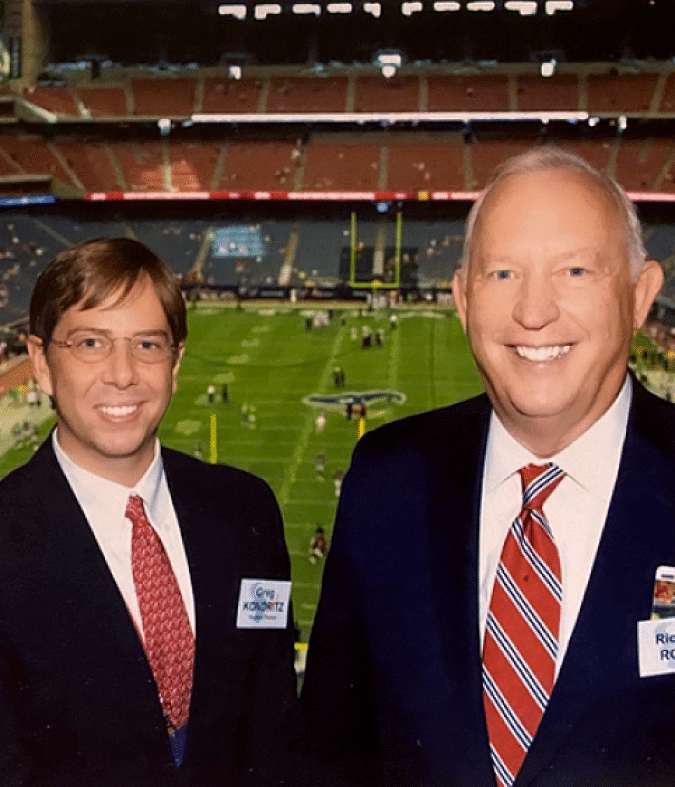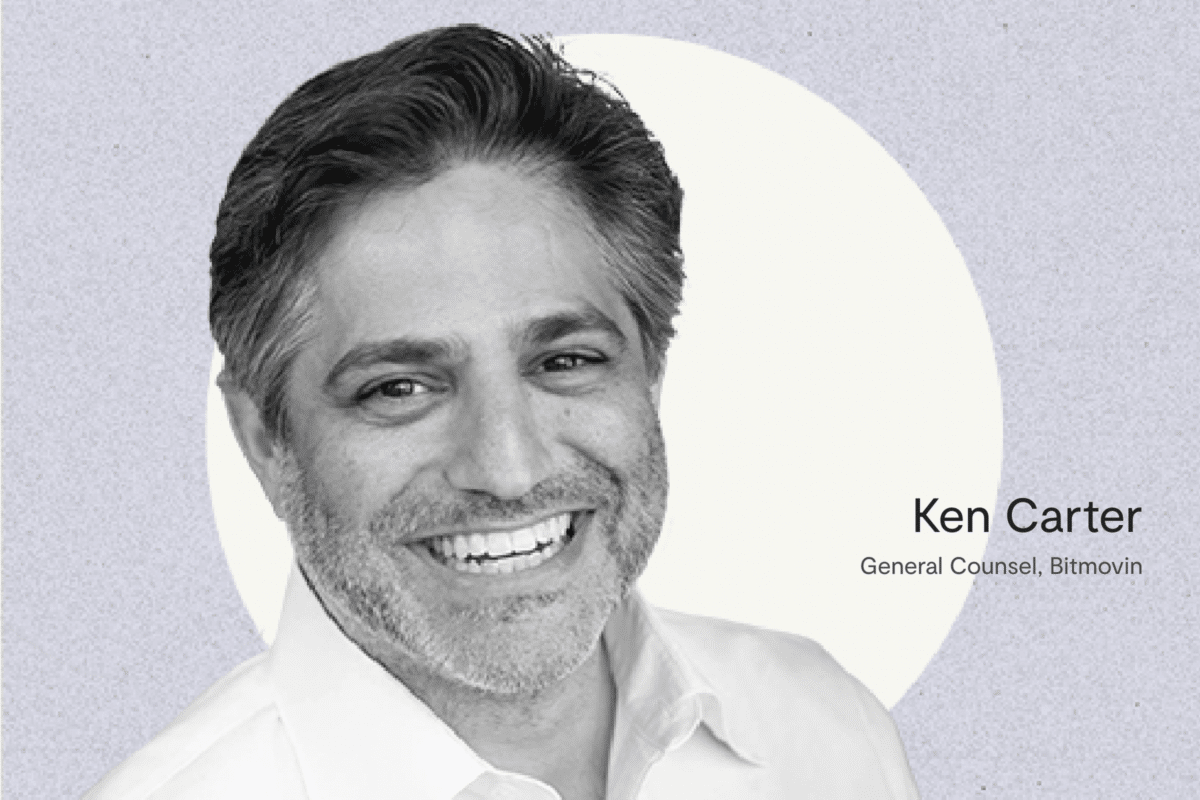Tell us about yourself, Greg.
I grew up in a small town in southern Illinois. After high school, I went to Murray State University in Kentucky for undergrad and then on to Vanderbilt University School of Law. After law school, I moved to Houston to practice corporate law at Fulbright & Jaworski L.L.P. I stayed there for five years and then went in-house with the Houston Texans and The McNair Group (our owner’s family office), where I’ve been the past 17 years. For the first 14 years, I split time between the two organizations and then transitioned to the Texans full-time about three years ago.
I met my wife, Alison, the first year that I was in Houston. Alison is a native Texan and we’ve created three native Texans—our kids, Jack, Katie, and Rowan. I’m the only non-Texan in my family, but as the saying goes, “I got here as quick as I could!”
You first started your career in Big Law. What drew you to go in-house?
I’m thankful that I had the opportunity to start my career at Fulbright & Jaworski. They provided great training, and I was able to learn from some of the best attorneys in the country. After a few years, I realized that one of the most rewarding aspects of being a lawyer for me was developing interpersonal relationships with clients and helping them achieve their goals. I felt that if I went in-house, then I could do that on a more consistent basis than in Big Law, where you might work closely with a client for a few months on a transaction but not again for several months or even years until their next significant transaction.
You earned a Bachelor of Science in Finance. How do you think your finance background has helped your legal career?
My finance degree provided me with a solid foundation to build upon as I’ve assimilated knowledge throughout my career. As part of my finance degree, I took courses in accounting, marketing, information systems, statistics, and other fundamental areas of business. We worked through management case studies, learned how to read and analyze financial statements, built spreadsheets, studied how the capital markets worked, and learned other key business concepts.
As my career has progressed, I’ve built upon that foundation where I now hope that my teammates would say that I add value not only from a legal perspective, but a business perspective, as well. Whether the issue is how we should acquire additional capital, drilling down on a term sheet for a business transaction, reviewing a pro forma financial statement for a potential event, or building a financial spreadsheet, I’m able to do that and help our team in those ways.
How have you partnered with the business side in running a professional sports team?
I try to excel at all aspects of the legal function. To use a football analogy, the role of in-house counsel for a professional sports team consists of playing offense, defense, and special teams.
The offensive aspect of the role consists of projects such as drafting and negotiating contracts to secure additional revenue for the team. The defensive aspect entails defending our organization against litigation, but also—and more importantly—identifying potential risks to the organization and implementing measures to mitigate that risk so that litigation doesn’t arise in the first place. Finally, the special teams part of the role encapsulates a variety of special projects that find their way to the Legal Department, such as drafting new policies and protocols required by the NFL.
What brings you the most satisfaction in your role? What makes you say, “Nailed it!”
Helping my teammates achieve their goals. At the end of the day, a lawyer’s role is to serve clients, not the other way around.
How are you moving forward in the new normal?
First, I would be remiss if I didn’t mention the unbelievable job that our IT Team, led by my teammate, Jeff Schmitz, has done in this crisis. Back in March, we made the decision on a Friday that we would be working from home. By Monday, our IT Team had given us the tools and equipment that we needed to do our jobs without missing a beat. They rapidly deployed a number of new products (which seem like old-hat at this point) such as Zoom and Microsoft Teams, which have provided us with perhaps even a greater level of collaboration than before.
In terms of the legal role, I’ve tried to stay laser-focused on a couple of overarching principles. One is that, although all projects are important, at a time like this, some projects are definitely more important than others from an overall business perspective. It’s important to recognize those projects and make sure that you nail them. Second, I’m trying to keep in mind the “counselor” role of the lawyer. I think it’s important now more than ever to listen to your teammates, try to understand what unique challenges and stresses that they may be going through at work and home, and do what you can to serve them.
Can you give an example of a value you talk about within your legal team and how that was exemplified?
One of the values that is most important to me as in-house counsel (and in my personal life, as well) is treating everyone with respect, regardless of their level in the organization or station in life. I think it’s important to know everyone’s name and get to know them personally. As in-house counsel, you want everyone in the building to have enough of a comfort level with you that they can talk to you about anything and trust your advice. I believe this extends beyond the legal department to the whole organization. Nobody is interested in hearing and heeding counsel—on a personal or in a professional context— unless they trust you and feel respected.
What legal trends in sports law interest you?
The rise of social media has created a dynamic and complex landscape—information can travel the world at lightning speed and be published to hundreds of thousands of people with the click of a button. It raises the stakes for in-house counsel of professional sports teams and other high-visibility brands.
What certifications or soft skills do you think are essential to succeed as General Counsel?
Integrity and the ability to maintain confidential information. At any point in time, in-house counsel of a sports team will likely have information that, if made public, would be the top story on ESPN.
Who or what inspires you?
Anyone who does their job with passion, enthusiasm, and at a high level of aptitude. For example, there is a pharmacy tech at our local Walgreens named Matt who I’ve had the pleasure of watching at work for several years. What struck me about Matt from the outset was his extremely high level of customer service and fervor for his work. After having been in the pharmacy only one time, the next time I came back in he greeted me with a smile and “Hello Mr. Kondritz, are you picking up for Mrs. Kondritz?” From the way that he greeted me, you would have thought that I was a foreign head of state being received at the White House for a state dinner. Perhaps the most remarkable quality about Matt is his consistency—no matter how busy the pharmacy may be, he always greets me with a smile and seemingly never has a bad day. That is the type of person who inspires me to perform my job at an equally high level of passion, enthusiasm, and high level of aptitude.
Do you have a mentor or serve as a mentor? How have you benefited from either role?
I’m a firm believer that there is wisdom in a multitude of counselors. I have an inner circle of people I go to when I need advice or a sounding board on a decision, with the specific person depending on the subject matter. My father-in-law is a trusted mentor and someone I esteem highly for his leadership as the patriarch of our family, his remarkable career and business acumen, and his exceptional interpersonal skills; he’s a man of great self-control, among other virtues, whom you cannot help but respect. I’ve learned from his example that you never need to lose your temper, raise your voice, or degrade another person to make your point.
My best and most frequent adviser is my wife—she is incredibly smart, has an enthusiasm for my work and keen understanding of the law, and she knows me better than I know myself, so I run a lot of things by her.
And, of course, when I need advice on a legal matter, I often contact General Counsel from other NFL clubs. We’re competitive on the field, but we’re collaborative and collegial off of it.
In terms of serving as a mentor, I meet with as many law students and young attorneys interested in sports law as my schedule allows.
What would you tell your 25-year-old self?
You will never regret not compromising your integrity; always do the right thing, no matter what it costs you.
What are two things people don’t know about you? Fun facts or secret talents?
I’m an avid (but novice) DIYer and woodworker. Whenever something breaks down at our house, I’ll try to fix it myself. I like the challenge of it and have found that whenever I’m working on a plumbing or electrical issue, for example, it takes my mind off of work and helps me press reset.
I grew up in a small, rural town but from a young age had aspirations of practicing law in a big city (specifically Houston). Ironically, these days we retreat to our family’s country property about 90 miles outside of town when we need a respite from the hectic pace of life. In a way it feels like I’ve come full circle in that regard.
What book are you reading right now?
Crunching Numbers by Jason Fitzgerald and Vijay Natarajan. It’s a must-read for anyone interested in working for an NFL club, as it explains the CBA, salary cap, and the intricacies of player contracts in a very accessible way.
I also recently re-read Emotional Intelligence by Daniel Goleman, which of course is a seminal read and beneficial regardless of what industry you work in. I’ve also been reading a lot of Harvard Business Review articles lately. They’ve had some excellent content lately about working from home, leadership development, and operating at peak performance. I particularly enjoyed The Making of a Corporate Athlete by Jim Loehr and Tony Schwartz, which is two decades old yet remarkably relevant for today’s climate.
Ironclad is not a law firm, and this post does not constitute or contain legal advice. To evaluate the accuracy, sufficiency, or reliability of the ideas and guidance reflected here, or the applicability of these materials to your business, you should consult with a licensed attorney. Use of and access to any of the resources contained within Ironclad’s site do not create an attorney-client relationship between the user and Ironclad.





